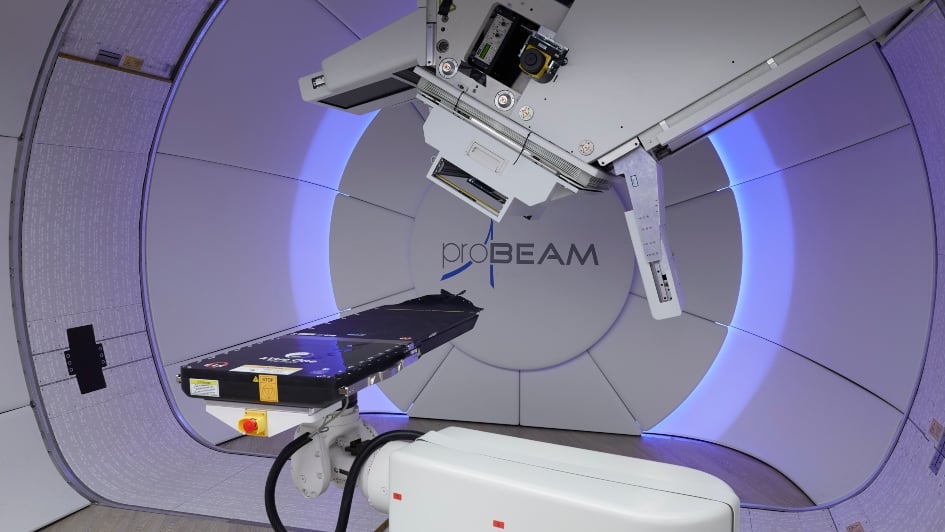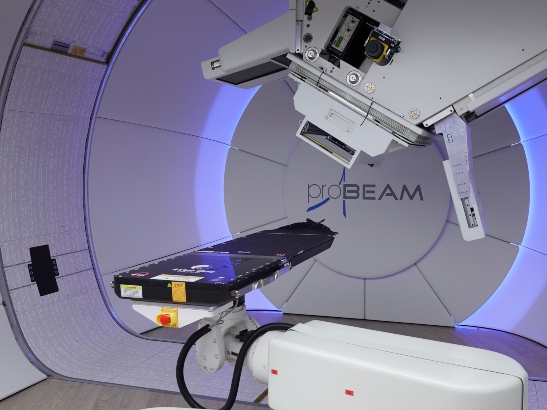
Image: The Proton Beam Scanner. Credit: The Royal Christie NHS Foundation Trust
The first proton beam therapy clinical trial in the UK, co-led by The Institute of Cancer Research, London, is now taking place at The Christie NHS Foundation Trust in Manchester.
The trial will determine whether the use of proton beam therapy reduces long-term side effects and improves quality of life for patients treated with radiotherapy for throat cancer.
The study, funded by Cancer Research UK with support from The Taylor Family Foundation started last year and, despite the Covid-19 pandemic, is recruiting ahead of target, with 37 patients so far taking part. In total 183 people will take part in the study, about two thirds will receive proton beam therapy, and a third will receive standard radiotherapy.
State of the art proton beam therapy
Currently all patients allocated proton treatment within the trial, which is called TORPEdO, receive this at the state of the art NHS proton beam therapy centre at The Christie in Manchester, which opened in 2018. Another centre is currently being built at University College London Hospitals.
A combination of chemotherapy and radiotherapy is usually effective in curing head and neck cancers, but radiotherapy can damage the healthy surrounding tissue. This can result in severe long-term side effects including dry mouth, loss of taste, difficulty chewing and swallowing and problems with hearing. Some patients might need to use a feeding tube for the rest of their lives.
Precisely target tumours
Proton beam therapy uses charged particles instead of X-rays and can target tumours more precisely, causing less damage to surrounding tissues.
A year after treatment, patients will be asked about their quality of life and doctors will assess the impact of any side-effects, and whether they still need to use a feeding tube a year after treatment, or have lost a significant amount of weight.
First proton beam therapy trial in the UK
Dr David Thomson, consultant clinical oncologist at The Christie and chief investigator on the trial, said:
“It’s very exciting and a privilege to conduct the first proton beam therapy trial in the UK here in Manchester. In what is a true team effort, the amount of support from colleagues across the country has been fantastic. There’s a real need to develop treatments which cause less side effects and improve long-term quality of life for patients with head and neck cancer. Proton beam therapy may do this, by reducing the damage to healthy surrounding tissues, so it was an obvious patient group to research first.
“Currently the proton beam therapy unit at The Christie is mainly used for children and young adults. We would like to make the facility available for other groups of adult patients who may benefit most from it too. The first step is to determine whether proton beam therapy improves side effects and quality of life for patients with throat cancer.”
Potentially transformative for patients
Professor Emma Hall, Deputy Director of the Clinical Trials and Statistics Unit at The Institute of Cancer Research, London, who co-leads the study, said:
“Radiotherapy is a highly effective treatment involved in around 40 per cent of cancer cures, but it can cause side effects where radiation affects nearby tissues, and this can be a particular problem for patients with throat cancers. Proton beam therapy has the potential to target tumours more precisely, with less spillover of radiation into the neighbouring healthy tissue.
“We think that for patients with throat cancer, proton beam therapy could be transformative – minimising side effects, improving recovery and sparing some people the long-term impacts of treatment, such as the need to use a feeding tube. This trial is an important first step in understanding if proton beam therapy can deliver on its promise, and if so who stands to benefit most.”
The researchers will also study which patients benefit most from proton beam therapy to help them determine who to offer the treatment to in the future in terms of who is most likely to see long-term improvements.
Around 11,700 people are diagnosed with head and neck cancer every year in the UK, and more than 8 in 10 patients suffering from throat cancer – such as tonsil and base of tongue cancer – receive radiotherapy as part of their treatment.
‘An incredible achievement’
Michelle Mitchell, chief executive of Cancer Research UK, said:
“It’s fantastic to hear that despite the challenges that this pandemic has thrown at us, patients with head and neck cancer have been able to access cutting-edge treatments like proton beam therapy. Many patients used to have to travel abroad to receive this type of treatment, so to be pioneering its use for adults in the UK is an incredible achievement.
“Cancer Research UK has a solid history of delivering practice-changing radiotherapy trials, which included making IMRT the gold standard for treating head and neck cancers. But there is always room for improvement, and we hope that proton beam therapy will be the next step in transforming the lives of people with neck and head cancer.”
Neville Shepherd from The Taylor Family Foundation said:
“We are delighted to see the trial proceed against the headwinds of Covid-19. It’s wonderful to know a cohort of 24 patients are already receiving proton beam therapy treatment for their throat cancer. We thank all involved for dealing with the challenges of set up and delivery of the trial in these extraordinary times.”
